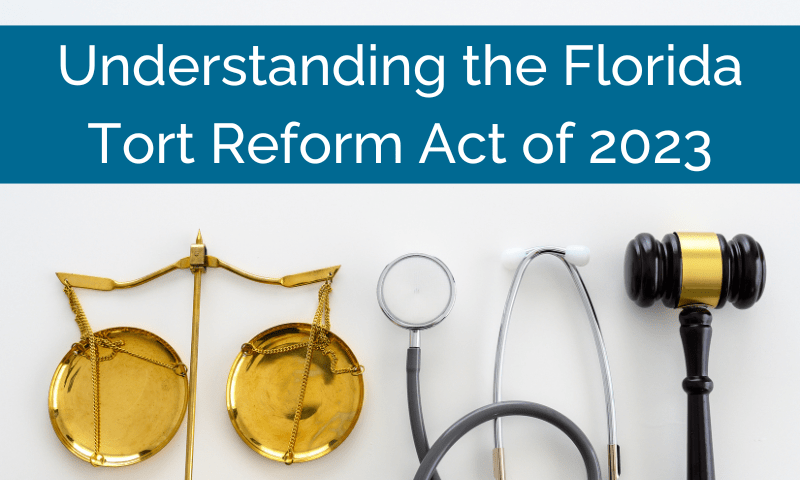Understanding the Florida Tort Reform Act of 2023
Florida Tort Reform Act of 2023
The Florida Tort Reform Act of 2023 is a significant piece of legislation that has brought substantial changes to the state’s legal landscape. Aimed at overhauling the civil justice system, the Act is designed to reduce frivolous lawsuits, lower insurance costs, and promote fairness in the legal process. In this blog post, we will delve into the key provisions of the Act, its implications, and the reactions from various stakeholders.
Key Provisions of the Act
- Caps on Noneconomic Damages The Act places limits on the amount of noneconomic damages (such as pain and suffering) that plaintiffs can recover in personal injury and medical malpractice cases. This cap is intended to prevent excessively large jury awards that can drive up insurance costs.
- Changes to Comparative Negligence Florida has adopted a modified comparative negligence rule. Under this system, a plaintiff’s recovery is reduced by their percentage of fault. However, if the plaintiff is found to be more than 50% at fault, they cannot recover any damages. This replaces the previous pure comparative negligence rule, where plaintiffs could recover damages even if they were 99% at fault.
- Attorney Fee Reforms The Act introduces changes to how attorney fees are calculated and awarded. This includes limiting contingency fees and requiring more transparency in fee arrangements. These measures aim to reduce the financial burden on defendants and encourage fairer settlements.
- Product Liability Reforms The Act introduces stricter standards for proving product liability claims. Plaintiffs must now demonstrate that a product was unreasonably dangerous and that the manufacturer failed to provide adequate warnings. This provision seeks to protect businesses from frivolous lawsuits and promote innovation.
- Statute of Limitations The statute of limitations for filing certain types of lawsuits has been shortened. This means that plaintiffs have less time to bring a claim, which is intended to expedite the resolution of disputes and reduce the backlog of cases in the court system.
Implications of the Act
- Impact on Plaintiffs and Defendants For plaintiffs, the caps on noneconomic damages and the modified comparative negligence rule may make it more challenging to secure large settlements or verdicts. On the other hand, defendants, particularly businesses and healthcare providers, may benefit from reduced litigation costs and lower insurance premiums.
- Insurance Industry One of the key goals of the Act is to lower insurance costs by reducing the frequency and severity of lawsuits. Insurance companies are expected to pass on these savings to consumers in the form of lower premiums. However, it remains to be seen how quickly and significantly these reductions will materialize.
- Legal Community The reforms to attorney fees and the statute of limitations will likely impact the legal community. Attorneys may need to adjust their practices and strategies in response to the new rules. Some may argue that the changes could deter attorneys from taking on certain cases, especially those with lower potential payouts.
Reactions to the Act
- Supporters Proponents of the Florida Tort Reform Act of 2023 argue that it will create a more balanced and predictable legal environment. They believe the reforms will attract businesses to the state, promote economic growth, and ultimately benefit consumers through lower costs.
- Critics Critics, however, contend that the Act unfairly tilts the scales in favor of corporations and insurance companies at the expense of individual plaintiffs. They argue that the caps on damages and stricter liability standards could limit access to justice for those who have been wrongfully injured.
- Neutral Observers Some observers take a more neutral stance, acknowledging the potential benefits of reducing frivolous lawsuits and lowering costs, while also expressing concern about the possible negative effects on plaintiffs’ rights and the overall fairness of the legal system.
Conclusion
The Florida Tort Reform Act of 2023 represents a significant shift in the state’s approach to civil justice. While it aims to reduce litigation costs and promote economic growth, its impact on plaintiffs, defendants, and the legal community will continue to be a subject of debate. As the reforms take effect, it will be essential to monitor their outcomes and ensure that the balance between protecting businesses and ensuring access to justice is maintained.
4o

